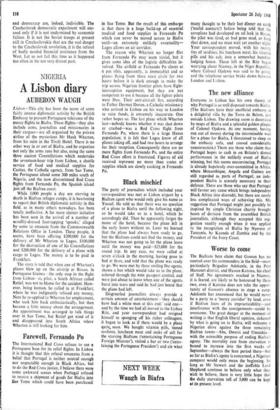A plea to the West
CZECHOSLOVAKIA JAN ADAM
Van Adam' is the pseudonym of a Czech rnarxist economist who spent several years in prison under the former Czech regime in the 1950s and now lives in England. He is in intimate touch with current political and eco- nomic events in his country. For personal reasons he prefers to remain anonymous.
It all really started in the autumn. To begin with it seemed to be one of those gestures of defiance from a small nation resentful at having to play the pawn to the interests of the great powers. The new leaders who emerged last autumn proclaimed that their programme was only an essential part of the permanent struggle of the Czech and Slovak nations for freedom, independence, democracy and progress. They sought, in the words of Alexander Dubcek, 'to express themselves in the creation of values which would help all people to live worthier lives and link up their national aims with the humanist aspirations of world culture.'
But there was no question of giving up the aims proclaimed by the Czech Communist party when it took over power, or reversing the political and economic measures which affected the bourgeoisie, and for that matter the whole nation, after February 1948. The new leaders never intended to return to the prewar situation, or to the situation prevailing prior to February 1948. Their programme was to improve the quality of the socialist system, to dissociate the Communist party as a whole from the errors of the past, to provide guaran- tees against a return to pre-January conditions, and to provide a higher phase of political economic cultural and social development.
Why, then, does Pravda talk of counter- revolutionary forces similar in character to those which promoted the Hungarian uprising in 1956, but even more treacherous in intent? Why the military pressure exerted by the members of the Warsaw Pact? Why the political and psychological campaign carried out through the series of conferences called by some of the Communist parties of Europe at the behest of Moscow? Why, above all, are the Soviet leaders so afraid of a process which is clearly intended to remain socialist in character, to cleanse the Communist party of its associa- tion with past crimes and serious errors, and to restore to the party the authority and con- fidence which it has forfeited over the last two decades just because of those crimes? Why should the Czech revolution, in the words of the Moscow commentator, 'haunt the socialist world as a spectre'?
The answer, I believe, is that there are two subjects about which Moscow is very sensitive. One is the role of the Communist party and the scope for political opposition to it. The second—and this is of particular importance in the case of Czechoslovakia, the most indus- 11 ialised country of the communist world—is the economic alliance between the Soviet Union and her neighbours.
In the public political discussions now going on all over Czechoslovakia the suggestion is often heard that it would be desirable to revive the old Social Democratic party and to invite it to cooperate in the drive towards democratisa-
tion. At the same time efforts are also being made to give a measure of independent existence and life to the political parties within the national front: the Czechoslovak People's party, the Czechoslovak Socialist party, the Freedom party in Slovakia. etc. Emphasis is also laid upon the fact that there are today millions of Czechs who are not politically organised, and yet who are the subject of decisions about which they are not consulted; and it is sug- gested that the existence of these masses beyond the political pale can only enhance the likeli- hood of a return to the bad old methods of the past.
The term used by the Czechoslovak People's party to express the new tendencies is plurality socialism: by which they mean a unity of purpose combined with a variety of interests, and a common determination to respect the basic human rights and equality of all citizens, irrespective of political inclination. Plurality socialism approves the Treaty of Friendship and Cooperation with the USSR and the other socialist countries. But it emphasises the need for equally close relations with all countries which strive for a peaceful solution of inter- national problems, and it supports the promo- tion of mutually advantageous political, economic and cultural links with all countries regardless of their political systems.
Even without the existence of an effective opposition party in Czechoslovakia their ideas suggest a model of society which is highly un- attractive to the leaders in the Kremlin. The Czech Communist party talks of 'blasting a path through the unknown environment': but the Russians fear that when the dust settles
'Will you take it with you, sir, or will you burn it here?'
it might be found that the blast had completely swept the communists from power—and not only in Czechoslovakia. This they cannot risk.
The second important point is that the present reforms have their roots in the state of the Czechoslovak economy. The process of 'democratisation' or 'liberalisation,' whichever it be called, is intended to overcome twenty years of economic isolation and link the Czech economy to a greater extent with that of the West. It is hard to say whether the original im- pulse was political or economic; but there is no doubt that the performance of the Czechoslovak economy has in recent years become a source of frustration. Czechoslovakia has been forced through Comecon and the framework of bi- lateral agreements to carry much of the burden of the industrialisation of the other communist countries, and primarily of the Soviet Union itself.
It has been made wholly dependent on the USSR for the main raw materials, which it processes into machinery for export back again to the USSR. There has been a steadily growing payment surplus with the Soviet Union but the Czechs may not convert it. Consequently they could not afford to buy the essential western machinery and technology needed for the modernisation of their own industry. The exces- sive dependence on the Soviet market does not provide any incentive either to innovation or to higher technology, in which Czechoslovak industry used to be so strong. Then there were the 'economics of fantasy' imposing a pattern of production and prices, wages and salaries, which resulted in a building worker earning twice or three times as much as a scientist or a doctor. Efforts to revamp the economy failed, for no economic reform can work without suflicient elbow-room.
But Czechoslovakia also has no convertible reserves with which to finance reforms. She cannot buy western machinery and technology. Hence the need for a foreign loan. If the Russians provide one, it will certainly be in- sufficient to cover any major changes in the structure of the economy, if only because a loan of sufficient magnitude would itself imply Soviet approval for the reform. Thus although every move by western governments to provide a large credit may be interpreted as an inter- vention in the internal affairs of the Communist bloc, there is nowhere else that Prague can turn.
Whatever our assessment of the development in Czechoslovakia is, the need for a change in economic policy is inescapable. Between the wars this small central European nation con- tributed 2 per cent of the world's industrial production. Yet since 1945 it has been com- pletely isolated from the western world—not least as a result of the West's own 'strategic' embargo policy—and it is now looking for ways and means to free itself from isolation. This brave effort deserves to be understood. If the essential reforms had to be financed out of the current income of the national economy, wage pressures and inflation would soon get out of control, and the dissatisfaction of workers whose living standard and jobs were threatened could easily bring the conservatives back to power again. Credits and loans will have to be granted as they are needed.
Historical opportunities for nations do not come often. An opportunity lost takes decades to return. What is happening in Prague this summer is of vital importance to the whole of Europe, indeed to the whole world. Freedom and democracy are, indeed, indivisible. The Czechoslovak democratic experiment will suc- ceed only if it is not undermined by economic failure. It is not the Soviet troops at present still in Czechoslovakia that are the real danger to the Czechoslovak revolution, it is the refusal of badly needed financial assistance from the West. Let us not fail this time as it happened too often in the not very distant past.







































 Previous page
Previous page